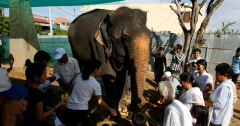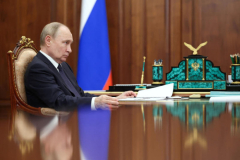As the United States winds back humanitarian assistance in Southeast Asia, its rival China may see an opportunity to expand its influence in a region where it has directed billions of dollars in investment and aid, analysts say.
In a little over three weeks since US President Donald Trump’s inauguration, Washington has frozen nearly all foreign aid and moved to effectively abolish the US Agency for International Development (USAID), a longstanding source of soft power in the region.
USAID, the biggest disburser of US foreign aid, spent $860m in Southeast Asia alone last year, funding projects on everything from treating HIV to preserving biodiversity and strengthening local governance.
Many projects, which run primarily through grants to local NGOs, face an uncertain future as the Trump administration pulls the US back from the world stage as part of his “America first” agenda.
For Beijing, the circumstances provide an ideal opportunity for it to step in, said Yanzhong Huang, a senior fellow for global health at the Council on Foreign Relations.
“The suspension of health, education, and humanitarian programmes – key pillars of US soft power – may create vacuums that China can fill,” Huang told Al Jazeera.
“This strategic retreat could strengthen Beijing’s influence across the region, particularly in current US aid recipients like Indonesia, the Philippines, Myanmar, and Cambodia.”
As the Trump administration generated headlines with its moves to gut USAID last week, Beijing made news by stepping in with $4.4m to fund a de-mining project in Cambodia that had been left in the lurch by Washington.
Heng Ratana, head of the Cambodian Mine Action Centre, told the Khmer Times newspaper the Chinese aid would help his organisation clear more than 3,400 hectares (8,400 acres) of land filled with landmines and unexploded ordnance.
China’s embassies in the US, Cambodia and Thailand did not respond to Al Jazeera’s requests for comment.
Joshua Kurlantzick, a senior fellow for Southeast Asia and South Asia at the Council on Foreign Relations, said USAID’s demise comes as US influence in the region is waning more generally and as China scales up its public diplomacy.
Southeast Asian leaders are concerned about “chaotic policymaking” in the US, Kurlantzick told Al Jazeera, particularly in countries such as Vietnam, Indonesia and Thailand, where the US devotes significant aid and security assistance.
“Beijing is indeed already portraying the US as uncaring and unable to lead regionally or globally and I expect Beijing to increase its aid and investment now in many parts of the developing world,” Kurlantzick told Al Jazeera.
While the future of many USAID programmes in the region is unclear, some analysts believe that China is likely to leave projects with a more political or ideological focus to other partners to the region, such as the European Union, Australia, Japan or the Asian Development Project, a Manila-based regional development bank.
“China’s existing international aid or international development programme is quite sizeable. But it happens to be quite different from what USAID does in that the latter seems to be devoting a lot of resources to ideology-based initiatives, for democracy, for LGBTQ, for diversity, for inclusiveness, for climate change,” John Gong, a professor of economics at the University of International Business an





